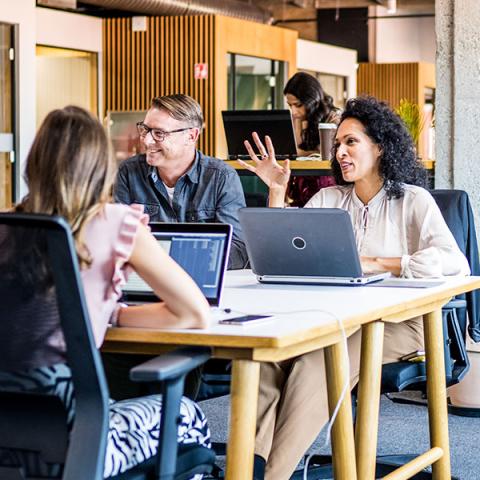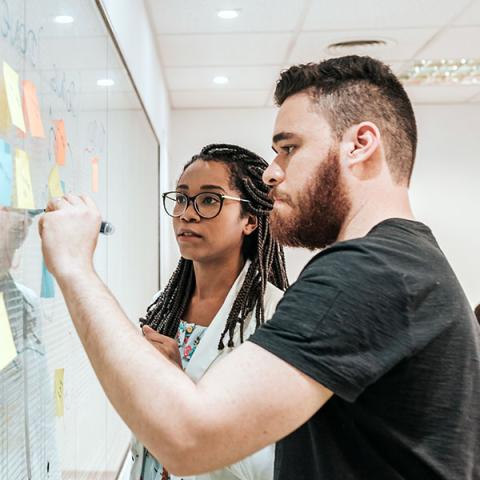Partnership Investments
Connecting the non-profit, public, and private sectors to build a stronger non-profit sector in Ontario.

The Partnership Investments program mobilizes relationships and resources to enable a more resilient and sustainable non-profit sector in Ontario.
Integral to OTF’s Grant Investment Framework, the program supports multi-stakeholder partnerships with the non-profit, public, and private sectors to build a stronger non-profit sector in Ontario. Each partnership aligns with one of the program’s Priorities Areas and has expected results and value for Ontario’s non-profit sector.
Partnerships are developed over time by building relationships and creating opportunities for collaboration.
On this page:
Purpose of partnerships
Through partnerships, OTF co-invests in projects that strengthen the infrastructure, resources, and relationships to build a stronger non-profit sector. We help create a foundation of enhanced support that drives innovation and deepens impact so that the non-profit sector thrives.
As a partner, OTF values opportunities to design, test, and learn with others. Partnerships fill critical gaps within the non-profit sector and address emerging issues to advance progress toward shared goals.

Creating long-term change for Ontarians
Investing in a resilient and sustainable non-profit sector.
OTF’s Grant Investment Framework is how we address both the immediate and long-term needs of Ontario’s non-profit sector.
Through local Community Investments grants, non-profit organizations can address the direct needs of their community members.
Through the Partnership Investments program, OTF helps build the capacity of the non-profit to support the long-term health of the sector.
The results seen through partnerships strengthen the sector and complement OTF’s community grants by identifying:
- The current state of the sector
- Emerging issues
- What can be reimagined
- Critical gaps in support systems

Collaborating and co-investing to achieve more
Building relationships and working together to do things in new ways.
Creating long-term change for the non-profit sector is not done alone.
OTF recognizes that it takes many funders, intermediaries, and organizations to effectively change the status quo and build better supports and resources for the sector to thrive and be sustainable.
Collaboration, learning, and sharing knowledge for a common goal are critical and enable us to do things in new and innovative ways.
We leverage OTF and partner investments to increase our impact and benefits to the sector. We believe that by co-investing, we increase the potential for lasting positive change.

Strengthening infrastructure and intermediaries
Responding to emerging sector needs and opportunities.
We continue to see opportunities to address resource gaps and challenges in our communities by strengthening the infrastructure that helps the non-profit sector thrive.
This infrastructure is the support system for non-profits, groups, and individuals working in the sector, which is driven by intermediaries that offer services focused on sustainability, learning, and building relationships. We broadly define intermediaries as organizations or groups that connect or facilitate networks, resources and/or people.
Intermediaries act as a much-needed bridge to different support systems that our communities need. The benefits of partnering with and strengthening intermediaries include:
- Wrap-around services and resources are offered by intermediaries to respond to the emerging needs and priorities of non-profits.
- Intermediaries help transform the non-profit sector in ways that ensure long-term health and sustainability.
- Intermediaries foster connections and encourage collaboration across funders, non-profit organizations, grassroots groups, and communities.
Partnership Highlight: New Power Labs Platform
Building on an earlier partnership that created New Power Labs (NPL), this partnership strengthened NPL and supported its work with financial institutions, foundations, and social finance intermediaries. This phase of the project helped build a strong network that will advance more equitable finance practices to better serve underrepresented communities.
NPL is a critical new intermediary in the social finance space that is working with others to reimagine traditional finance practices.
NPL has established itself with the launch of a fully bilingual website with curated insights and by sharing its learnings across multiple channels, including at over 30 conferences.
- Priority Area: Innovation
- Outcome: Strengthen social finance infrastructure and intermediaries
- Partners: Marigold Capital, DUCA Impact Lab, Community Foundations of Canada, and Coastal Capital Savings.
New Power Labs Impact Report
Read the report to learn more about the work of this critical intermediary.
Read the 2020-22 New Power Labs Impact ReportPriority areas
The Partnership Investments program mobilizes relationships and resources to strengthen the sector in four priority areas and in ways that no one partner can do alone. Through different types of partnership activities, we strategically work towards our long-term goals in the following four areas.

Inclusive and resilient sector
Build a sector that is resilient, adaptive, and inclusive.
With partners, OTF will achieve the following outcomes:
- Grow the resilience and adaptive capacity of the sector to navigate uncertainty and change.
- Respond to the priorities and needs of smaller organizations.
This can look like:
- More and better infrastructure to support access to and responsible use of technology in the sector.
- Increased access to shared platforms for learning, networking, and shared administrative supports.
As the sector's resilience is steadily nurtured, communities will benefit from the continuity of service delivery and evolving program models that respond to current realities and context.

Data and learning
Support the sector in its need for data, learning, and action.
With partners, OTF will achieve the following outcomes:
- Strengthen infrastructure and intermediaries for more data, learning, and action.
- Enhance culture, skills, and practices to use data for community well-being.
This can result in:
- Access to intermediaries and knowledge products that include data platforms, sets, and tools.
- Improved sector capacity to access, collect, analyze, and use data for learning and action.
- More ethical, equitable, and culturally specific approaches which are driving the data cycle.
As the data capacity of the sector improves, communities will benefit from more responsive policies, programs, and services.

New sources of capital
Build a stronger community social finance system to support the sector.
With partners, OTF will achieve the following outcomes:
- Strengthen social finance infrastructure and intermediaries.
- Increase access to capital in new and different ways to build the financial sustainability of the sector.
This can result in:
- Improved capacity of intermediaries to sustain delivery of place-based social finance funds.
- New and more strategic methods and approaches for mobilizing capital in support of community-led work.
- Greater equity in the flow of capital in support of social impact work.
As social finance systems grow, communities will benefit as capital flows in new and more equitable ways.

Social research and development (R&D)
Help the sector use social R&D methods to deepen community impact.
With partners, OTF will achieve the following outcomes:
- Strengthen infrastructure and intermediaries for social R&D.
- Enhance social R&D culture, craft, and skills.
- Use social R&D practices to reimagine systems for lasting social impact.
This can result in:
- Sustained use of diverse social R&D methodologies that enable continuous process, service, and systems innovation within and across communities.
- Improved systems leadership across all parts of the sector.
- Improved understanding and capacity of the sector to explore new ways to respond to community priorities.
As the sector promotes vibrant social R&D practices, communities will benefit from new ideas and solutions, and improved systems for lasting impact.
Partnership activities
How partnerships are delivered
Partnership work leads to new and stronger relationships, engagement with sector leaders, and resources that support the critical work happening across the sector. Our investments advance each of the program’s four priority areas and can be delivered in different ways.
Partnership projects
Through partnership projects, we collaborate and leverage resources through focused engagement and resources for a specific initiative. This can look like:
- Better understanding of the current state of the non-profit sector.
- Reimagining the support systems that build healthy and vibrant communities.
- Filling critical gaps within the sector and advancing progress towards shared goals.
Partner convenings
We help bring people together to learn, grow ideas, create solutions, and develop networks or learning labs. Through convening activities, we:
- Understand the sector in more nuanced ways and through diverse perspectives.
- Discover synergy and opportunities to amplify impact.
- Support networks and build relationships which are essential tools to help create long-term social impact.
Knowledge mobilization
Partners and other stakeholders share learnings, research, and data in ways that are accessible and useful to the broader non-profit sector. Through our partnership activities, we:
- Develop practical guides to support sector leaders to build their capacity and take action in their work.
- Produce new knowledge products or stories to raise awareness about practices and issues relevant to the sector.
- Conduct and share research on topics related to the program’s priorities.
Partnership Highlight: Data for Equity Pilot Program
This pilot program helped organizations collect socio-demographic data of program participants and offered best practices for respectful and ethical data collection.
Through a combination of workshops and hands-on experience using the provided survey tool, 53 organizations increased their knowledge of respectful and ethical data collection.
Through this pilot, specific resources, skills, and support systems were identified to help organizations successfully collect and use data to advance their work.
Key learnings include being transparent about why data is being data collected, the importance of relationships with those whose data is being collected, and having skilled staff to do the work.
- Priority Area: Impact
- Outcome: Enhance culture, skills, and practices to use data for community wellbeing
- Partners: Findhelp 211, United Way of Greater Toronto, City of Toronto, Toronto Nonprofit Network, Toronto Aboriginal Support Services Council, Urban Alliance on Race Relations, Family Services Toronto, For Youth Initiative, Jewish Family & Child Services, YMCA.
Evaluation and Capacity Building Reports
To learn about key learnings and recommendations, read the Evaluation and Capacity Building Reports.
Read the Evaluation and Capacity Building ReportsConnect with us
Are you part of a collaborative that is working to advance improvements for the sector in one of the program’s priority areas? Connect with us to share your work and ideas and learn more about OTF’s Partnership Investments program.
There is no application process for this program. Partnerships are developed over time as we build relationships, work towards mutual goals, and identify opportunities for collaboration.
Contact our team at partnerships@otf.ca.

